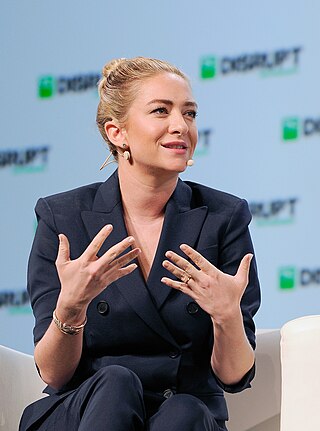
Online dating, also known as internet dating, virtual dating, or mobile app dating, is a method used by people with a goal of searching for and interacting with potential romantic or sexual partners, via the internet. An online dating service is a company that promotes and provides specific mechanisms for the practice of online dating, generally in the form of dedicated websites or software applications accessible on personal computers or mobile devices connected to the internet. A wide variety of unmoderated matchmaking services, most of which are profile-based with various communication functionalities, is offered by such companies.
RateMyProfessors.com (RMP) is a review site founded in May 1999 by John Swapceinski, a software engineer from Menlo Park, California, which allows anyone to assign ratings to professors and campuses of American, Canadian, and United Kingdom institutions. The site was originally launched as TeacherRatings.com and converted to RateMyProfessors in 2001. RMP was acquired in 2005 by Patrick Nagle and William DeSantis. Nagle and DeSantis later resold RMP in 2007 to Viacom's MTVU, MTV's College channel. Viacom owned and operated RateMyProfessors.com for a decade. Cheddar announced its acquisition of RMP from Viacom in 2018. Cheddar was acquired by internet service provider Altice USA in 2019. Cheddar was then sold to media company Archetype in December 2023. RMP is the largest online destination for professor ratings. The site includes 8,000+ schools, 1.7 million professors, and over 19 million ratings.

OkCupid is a U.S.-based, internationally operating online dating, friendship, and formerly also a social networking website and application. It features multiple-choice questions to match members. Registration is free. OkCupid is owned by Match Group, which also owns Tinder, Hinge, Plenty of Fish, and many other popular dating apps and sites.
Mobile dating services, also known as cell dating, cellular dating, or cell phone dating, allow individuals to chat, flirt, meet, and possibly become romantically involved by means of text messaging, mobile chatting, and the mobile web.

Elastic Reality was a warping and morphing software application available on Windows, Macintosh, and Silicon Graphics workstations and was discontinued in 1999.
A review site is a website on which reviews can be posted about people, businesses, products, or services. These sites may use Web 2.0 techniques to gather reviews from site users or may employ professional writers to author reviews on the topic of concern for the site.
Badoo is a dating-focused social network founded by Russian entrepreneur Andrey Andreev in 2006. It is headquartered in Limassol, Cyprus and London, United Kingdom, with offices in Malta, Russia and the United States. It operates in 190 countries and is available in 47 languages, making it the world's most widely used dating network. The app is available on iOS, Android, and the web. Badoo operates on a freemium model, whereby the core services can be used without payment.
This is a partial, non-exhaustive list of notable online dating websites and mobile apps.
Andrey Andreev is a multinational tech entrepreneur. He is known for founding the dating and social networking apps Bumble and Badoo, amongst others. In 2019, Andreev sold the apps' holding company, MagicLab, to Blackstone at a $3 billion valuation. In 2020, he founded social audio app Stereo. His previous ventures include SpyLog, Begun, and Mamba.

SingleMuslim.com is a matrimonial website designed for and marketed to Muslims. The website was launched on 1 August 2000, and its headquarters is in Wakefield, West Yorkshire, England.

Lulu is a mobile app formerly available for iOS and Android that allowed female users to make positive and negative evaluations of male users on the basis of their romantic, personal, and sexual appeal. The app allowed only female users to access the evaluation system, and evaluations made through the app are attached publicly and anonymously.

Whitney Wolfe Herd is an American entrepreneur. She is the founder, executive chair, and former CEO of publicly traded Bumble, an online dating platform, launched in 2014. She is a co-founder of Tinder and was previously its Vice President of Marketing.
Bumble is an online dating and networking application launched in 2014. Profiles of potential matches are displayed to users, who can "swipe left" to reject a candidate or "swipe right" to indicate interest. The app is a product of Bumble Inc., founded by Whitney Wolfe Herd shortly after she left Tinder. Wolfe Herd has described Bumble as a "feminist dating app".
This timeline of online dating also includes broader events related to technology-assisted dating. Where there are similar services, only major ones or the first of its kind are listed.

Alexandra Chong is a Jamaican entrepreneur. She is the founder and CEO of Jacana, a global cannabis company. Jacana cultivates, develops and distributes medical cannabis internationally and in a historic move, it was the first company to export Jamaican medical cannabis flower internationally.

Huggle was a location-based social application which connected users based on commonality of places they frequent. The app was developed through a partnership with entrepreneur Andrey Andreev. Following a soft launch in 2015, it was officially launched in July 2016. It was acquired by Badoo in 2018. In 2020 Bumble decided it would no longer maintain the platform.
An online dating application, commonly known as a dating app, is an online dating service presented through a mobile phone application. These apps often take advantage of a smartphone's GPS location capabilities, always on-hand presence, and access to mobile wallets. These apps aim to speed up the online dating process of sifting through potential dating partners, chatting, flirting, and potentially meeting or becoming romantically involved.

FaceApp is a photo and video editing application for iOS and Android developed by FaceApp Technology Limited, a company based in Cyprus. The app generates highly realistic transformations of human faces in photographs by using neural networks based on artificial intelligence. The app can transform a face to make it smile, look younger, look older, or change gender.

Hily is an online dating application that employs machine learning to match prospective partners. Named as an acronym for "Hey, I Like You", the app is designed to recommend potential matches by analyzing users' backgrounds, interests, and app activity. The app's registration options for gender include male, female, and non-binary.
"The Old Man and the Seat" is the second episode of the fourth season of the Adult Swim animated television series Rick and Morty. Written by Michael Waldron and directed by Jacob Hair, loosely adapting The Old Man and the Sea by Ernest Hemingway, the episode aired in the United States on November 17, 2019.









